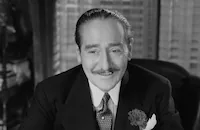The Price of Happiness
Cast & Crew
Edmond Lawrence
Mary Boland
Marion Singer
Enid Francis
Carlotta De Felico
Albert Bechtel
Film Details

Synopsis
Ruth has become a millionaire's mistress, Evelyn is a kept woman and Lucille, an opera diva, has carried on a long affair with a married impresario. Their friend Bertha Miller, however, feels stuck in a life of middle-class boredom with her cobbler husband John. Even though she is jealous of their fast-paced life styles, Bertha has John make a pair of shoes for each of the women, and delivers the presents herself. Almost as soon as she gets to Evelyn's home, the police arrive to arrest Evelyn's benefactor on a burglary charge. Next, Bertha visits Lucille, and arrives just in time to see the impresario's enraged wife pour acid down the singer's throat. Finally, a bewildered Bertha goes to see Ruth, whose lover has also come for a visit, and when he begins flirting with Bertha, Ruth commits suicide. No longer jealous, Bertha quickly returns to John and remains forever content with her peaceful, unexciting life style.

Director
Edmond Lawrence
Cast

Mary Boland
Marion Singer
Enid Francis
Carlotta De Felico
Albert Bechtel
Dave Wall

Adolphe Menjou

Film Details

Quotes
Trivia
Notes
The copyright entry for this film states that it was "based on the play Three Pairs of Shoes which was adapted from an Austrian source by Ruth Comfort Mitchell." No information has been located concerning the Austrian play. There have been a number of versions of the play both in English and other languages, dating from the late 1880's and after. Concerning Mitchell's contribution, the wording in the copyright entry is ambiguous: she May have adapted the Austrian source for this film or she May have adapted it for a play which served as the basis of this film. Julius Steger, the head of Triumph Film Corp., is listed in the copyright entry as "author," but this listing probably only establishes him as "author" for copyright claimant purposes rather than reflecting any contribution on his part to the story or scenario. Mrs. Edna G. Riley worked on the film, according to the 1918 MPSD, but it is unclear whether she served as a writer or an assistant director.












